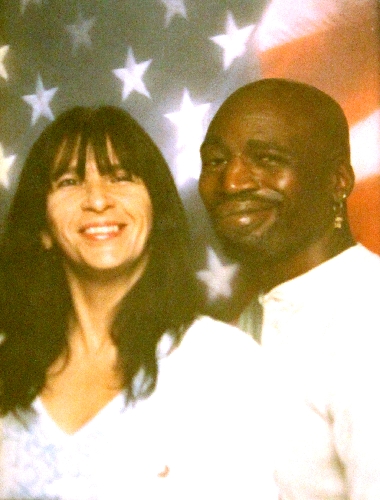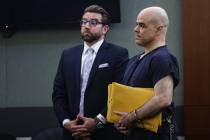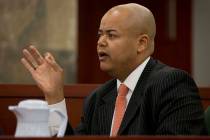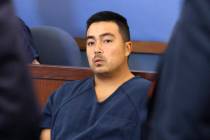DA will seek indictment of Metro officer who killed disabled veteran
Clark County District Attorney Steve Wolfson will seek an indictment against Las Vegas police officer Jesus Arevalo in the controversial fatal shooting of Stanley Gibson.
The Review-Journal has learned that a grand jury is expected to start hearing testimony in the case next week. More than a dozen witnesses are likely to testify, meaning it could take weeks or even months for prosecutors to present their case. Grand juries are closed to the public.
The action could result in the first indictment against a Las Vegas police officer for an on-duty shooting in at least 20 years, if not the first ever. Wolfson, through an assistant, declined comment.
Sheriff Doug Gillespie did not respond to requests for comment late Monday. In a video sent to all 5,600 department employees last week, Gillespie said he expects Wolfson to take the case to the grand jury but said he does not believe the shooting rises to a "criminal matter," according to several people who have seen the video.
A police spokesman Monday refused to make public the video, saying it was an internal, copyrighted video for employees only.
Chris Collins, executive director of the Las Vegas Police Protective Association, welcomed Gillespie's stand on the case but added, "As much as we appreciate the sheriff's video to the members of the department, we believe that the video should be released to the public so the public understands the sheriff doesn't believe the shooting was criminal."
POLICE ENCOUNTER GIBSON
Gibson, a 43-year-old disabled Gulf War veteran, was apparently lost and distraught when Las Vegas police encountered him in the parking lot of a northwest valley apartment complex early on Dec. 12. His car was boxed in by two police cars, but he didn't respond to commands to exit his vehicle.
Police hatched a plan to remove him from the car: One officer would shoot out a window with a beanbag shotgun round, and another would douse the interior with pepper spray. But when the shotgun was fired, Arevalo shot seven times into the vehicle with an AR-15 rifle. Gibson, who was unarmed, died at the scene. The shooting was captured on video.
The grand jury will decide whether prosecutors have enough evidence to take the case to trial. It's unknown what charges prosecutors will seek.
Nevada, like many states, gives police wide discretion when using their firearms. Officers can legally shoot at someone if they can show a reasonable belief that the subject poses an imminent danger of death or serious physical injury to the officer or another person.
The law can legally excuse officers who shoot at unarmed people, for example, if the officer can show that a reasonable person in the same situation would have done so.
Cal Potter, the attorney representing Gibson's wife in a planned lawsuit, said he would be surprised if the grand jury hands up an indictment, given the county's history of coroner's inquests that almost always find that officers' actions were justified in a death.
"From over 30 years of experience in these cases, I think the inquests have all been orchestrated, and I don't have a reason to believe that anything else would not be orchestrated," he said. "The track record just hasn't been there."
County prosecutors have, until this year, used the quasi-judicial coroner's inquest juries for opinions on whether to indict an officer for an on-duty shooting. Only once has a coroner's jury decided the shooting was criminal. But when prosecutors in the 1976 case took that decision to a grand jury, it refused to indict the two Las Vegas officers.
Collins said that before the inquest process all police shootings were vetted by grand juries. The reason the inquest process was created was because the community wanted to a more open process, he said.
Collins questioned why Wolfson will use a grand jury and not seek a criminal complaint at a preliminary hearing in open court before a justice of the peace.
"If Wolfson believes this case is criminal, why is he hiding it in a grand jury? Why not take it to a preliminary hearing," Collins said.
Collins said the Gibson shooting was a tragedy, but not criminal.
"Why not put it in open court," Collins asked. "Let it fall where it falls. We believe we will prevail in either instance."
WIDOW APPEALS FOR JUSTICE
Meanwhile, Gibson's widow, Rondha Gibson, said she hopes the grand jury can get justice for her husband.
She said she couldn't discuss a potential lawsuit against the police department but said a grand jury's decision is more important because money can't bring back her husband. She also said Gillespie's support of Arevalo is disturbing.
"I want him prosecuted," she said of Arevalo. "I want him to serve time for what he did. ... I want him to know what it feels like to lose everything."
The widow said one of the most painful aspects of her husband's death is that she wasn't with him to protect him.
"We were never apart, but I was not there to help him when he needed me the most," she said.
Andre Lagomarsino, an attorney representing Gibson's mother, Celestine Gibson, said he is happy Wolfson will take the case to a grand jury because the Gibsons want Arevalo "criminally charged."
Lagomarsino also expressed disappointment, but not surprise, that Gillespie is backing his officer.
"The support of Arevalo is consistent with the policy of supporting police officers who shoot unarmed men," the lawyer said.
Lagomarsino represented the family of Trevon Cole, 21, an unarmed small-time marijuana dealer who was killed by an officer during a botched drug raid in June 2010. In January, Las Vegas police settled with the Cole family for a record $1.7 million.
Lagomarsino in May filed a federal lawsuit naming Las Vegas police, Arevalo and two of his supervisors seeking more than $20 million in relation to Gibson's death.
The high-profile and controversial shooting of Gibson attracted public attention not just because it was captured on video. Las Vegas police had been under scrutiny since Cole was killed in his bathroom the year before, and just days before Gibson's death, the Review-Journal published an in-depth investigation showing that the department was reluctant to learn from, and hold officers accountable for, problem shootings.
Former District Attorney David Roger is expected to represent Arevalo in the criminal matter. Wolfson earlier this year was appointed by the County Commission to replace Roger, who resigned to become the counsel for the largest Las Vegas police union.
Las Vegas Review-Journal writer Brian Haynes contributed to this story. Contact reporter Francis McCabe at fmccabe@reviewjournal.com or 702-380-1039.
Deadly Force: When Las Vegas Police Shoot, and Kill
Las Vegas Review-Journal investigative series




























